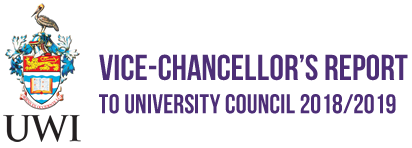The UWI's 10 in 2 Austerity Plan

The Senior Executive Management Team of The UWI emerged from a two-day strategic planning retreat with a deeper focus on the University's financial condition and commitment to regional economic growth.
Examining the first two years of The UWI's performance within the context of its five-year Triple A Strategic Plan 2017–2022, themed "Revitalising Caribbean Development", management converged on the need for even greater financial efficiency.
Considerable strides were made on strategic outcomes such as research recognition, global impact and leadership, access to teaching and learning, and public accountability. However, the University sees the economic sustainability of the region as its most important challenge, hence greater focus on the institution's financial health in order to be an effective development partner.
The University, in the last two decades, has been challenged with rising levels of receivables from governments on account of the narrowing fiscal space associated with falling competitiveness and meeting IMF conditionalities. The impairment of these debts and other write-offs in the last decade has meant a considerable loss to the University. To remedy this situation, prime ministers at the CARICOM Heads of Government Meeting in Haiti agreed to assist with an assets-for-cash swap, a welcome response that motivated the University to accelerate its comprehensive austerity programme.
Evolving from the retreat discussions, Vice-Chancellor, Professor Sir Hilary Beckles approved a “Ten in Two Strategy”; calling on all campuses and Regional Headquarters/ Vice-Chancellery administration to cut expenditures by 10% over the next two years. All UWI entities have been tasked with consolidating academic programmes, adopting a robust out-sourcing methodology that targets non-core expenditures, and diving deeper into the digital culture in search of cost reductions and savings.
Simultaneously, the Vice-Chancellor requested that operational units increase top line revenue-generation by 10% over the same period, to achieve a UWI-wide savings of approximately US$30 million.

